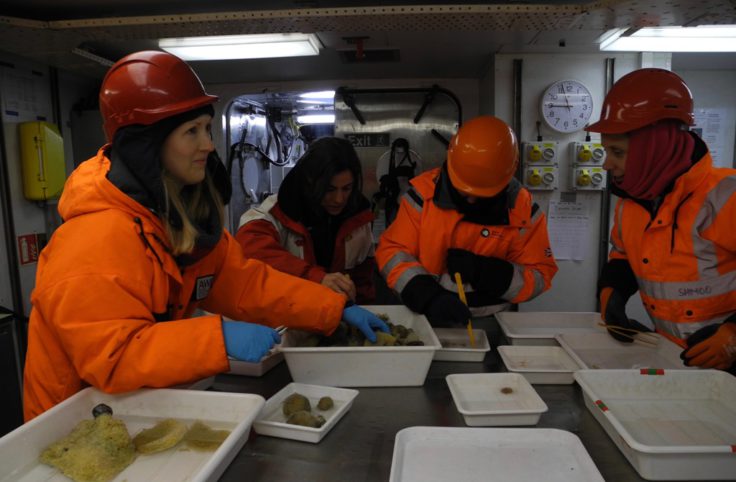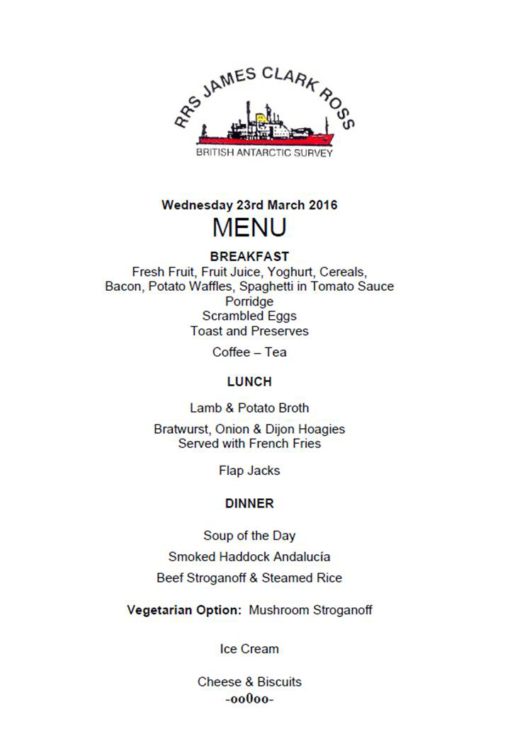SHIP BLOG: Rhythm of the night
25 March, 2016 RRS James Clark Ross
Oh look it’s snowing/raining and getting dark… it must be time for the Night Shift.
I’m Hilary, the night shift leader on the SO-AntEco scientific cruise to the South Orkney Islands area, and this is my third time on the James Clark so I’m fairly used to the layout of the science work areas. At BAS I manage the geological labs and deal with rock and fossil collection and cataloguing. This is a useful skill on this cruise as it’s very important to keep track of all the different samples we collect. We have a handwritten book in the lab, and a computer database where every specimen is given a unique number before being preserved.

To make the most of our time at sea, the science team is working 24-hours a day, divided into two shifts. The night shift have been working a 7pm-7am pattern for the past 2 weeks and are all looking forward to finishing the shift work in a couple of days. Everyone gets tired but we all work together and help each other with the sorting, preserving and recording.
What we catch at night is pretty much the same as the Day Shift since, at the depths we are fishing (500 – 2000m), the surface daylight doesn’t make much difference. Fish, octopus, sea-pigs, sea-stars, brittle-stars, worms, shrimps and sponges are common and as I do more recording I’m beginning to learn the scientific names for some of them – Ophiuroidea, for example, are brittle-stars.
The thing about working at night is that you can’t see the size of the waves until the back of the deck is lowered and the sampling gear is deployed or retrieved, but you certainly feel it when the ship rolls. You also can’t see the icebergs so occasionally the aft deck where we work is bathed in the searchlights from the bridge as the officers on duty watch for hazards.
We trawl in all weather conditions – rain and snow, wind and fog – provided it’s safe to do so. Sometimes it takes four people to handle the heavy gear and deploy it in the water safely. We enjoy telling our tales of hardship in blizzards and darkness to the Day Shift when they wake up!

Sometimes the trawl net is full of mud that needs to be sieved and cleaned before it can be sorted. Washing on this scale is done on deck in a big box sieve, using the seawater hose to clean away the mud. Everyone gets wet and filthy!
The rest of the time we are processing and working with specimens from previous catches or keeping up with the paperwork and dreaming about the next meal.
We appear to spend a lot of our down-time discussing food, usually of the “have you ever tried…” variety. Cereals and toast are available at any time of day, but when I wake up, I generally start my shift with ‘dinner’ at 6pm as it’s a way of being sociable with some of the day shift. Strangest breakfast so far – Haggis pakora.
The night is broken by a meal in the ‘duty mess’ (where the crew eat whilst on duty) at around midnight. Colin, the night chef, provides a good, hearty meal for all the shift workers and sets us up for the last 7 hours of the shift. Colin also does the biscuit baking during the night and in the early hours, between trawls, a fresh baked cookie really hits the spot.

Our shift ends just before breakfast so it’s cereal and toast or bacon and egg before bed. We’ll be up again by 7pm ready for whatever the next night brings.
Note: Since writing this, we have finished night shift and gone back to day work. Mostly packing and preparing the specimens for transport back to the UK.